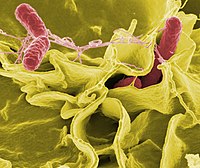
Absolute quantification of targeted meat and allergenic protein additive peptide markers in meat products.
Sign Up to like & getrecommendations! Published in 2019 at "Food chemistry"
DOI: 10.1016/j.foodchem.2018.08.131
Abstract: We present an implementation of the absolute quantification (AQUA) method for monitoring of peptide abundance in complex mixtures of processed proteins. Specific peptide markers from meats (chicken, duck, goose, pork and beef) and common protein… read more here.
Keywords: absolute quantification; protein; quantification targeted; peptide markers ... See more keywords

Mass spectrometry determination of potential species-specific peptide markers in commercial seasoning cubes
Sign Up to like & getrecommendations! Published in 2021 at "Journal of Food Composition and Analysis"
DOI: 10.1016/j.jfca.2021.104193
Abstract: Abstract In recent years, issues related to food product authenticity have been alarming, particularly in meat-based products. Proteomic techniques in food authentication and their applications in determining quality and safety issues of ingredients have been… read more here.
Keywords: potential species; specific peptide; peptide markers; commercial seasoning ... See more keywords

Identification of Salmonella Taxon-Specific Peptide Markers to the Serovar Level by Mass Spectrometry.
Sign Up to like & getrecommendations! Published in 2019 at "Analytical chemistry"
DOI: 10.1021/acs.analchem.8b04843
Abstract: We present an LC-MS/MS pipeline to identify taxon-specific tryptic peptide markers for the identification of Salmonella at the genus, species, subspecies, and serovar levels of specificity. Salmonella enterica subsp. enterica serovars Typhimurium and its four… read more here.
Keywords: taxon specific; peptide; salmonella; peptide markers ... See more keywords

Distinguishing African bovids using Zooarchaeology by Mass Spectrometry (ZooMS): New peptide markers and insights into Iron Age economies in Zambia
Sign Up to like & getrecommendations! Published in 2021 at "PLoS ONE"
DOI: 10.1371/journal.pone.0251061
Abstract: Assessing past foodways, subsistence strategies, and environments depends on the accurate identification of animals in the archaeological record. The high rates of fragmentation and often poor preservation of animal bones at many archaeological sites across… read more here.
Keywords: iron age; mass; zooarchaeology; peptide markers ... See more keywords

Qualitative and Quantitative Analysis of Ejiao-Related Animal Gelatins through Peptide Markers Using LC-QTOF-MS/MS and Scheduled Multiple Reaction Monitoring (MRM) by LC-QQQ-MS/MS
Sign Up to like & getrecommendations! Published in 2022 at "Molecules"
DOI: 10.3390/molecules27144643
Abstract: Donkey-hide gelatin, also called Ejiao (colla corii asini), is commonly used as a food health supplement and valuable Chinese medicine. Its growing popular demand and short supply make it a target for fraud, and many… read more here.
Keywords: animal gelatins; peptide markers; monitoring mrm; using qtof ... See more keywords